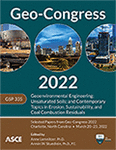Effect of Inorganic Solutions on the Free Swell Index of Polymerized Clays
Publication: Geo-Congress 2022
ABSTRACT
The usage of polymer-modified clays to construct hydraulic barriers has gained popularity due to their superior hydraulic properties. Altering the clays using polymer enhanced the chemical resistance of composite material in containing aggressive inorganic solutions to which the untreated virgin clays fail. The present study is focused on evaluating the free swell index of clays modified through the in situ polymerization of acrylic acid. Tests were conducted on two mineralogically diverse clays, i.e., Na-bentonite and kaolinite, using interacting liquids such as NaCl, CaCl2, AlCl3, and solutions with extreme pH conditions. The swell index of polymerized clays was in the order of monovalent > divalent > trivalent solutions and was higher than the swell index of the untreated clays. Test results showed that the polymer addition had improved the swelling capacity of clays. However, hydraulic conductivity tests are needed to be performed to ascertain their long-term hydraulic performance.
Get full access to this article
View all available purchase options and get full access to this chapter.
REFERENCES
ASTM D2216. (2019). Standard Test Methods for Laboratory Determination of Water (Moisture) Content of Soil and Rock by Mass. ASTM International, West Conshohocken, Pennsylvania, USA.
ASTM D2487. (2017). Standard Practice for Classification of Soils for Engineering Purposes (Unified Soil Classification System). ASTM International, West Conshohocken, Pennsylvania, USA.
ASTM D4318. (2017). Standard Test Methods for Liquid Limit, Plastic Limit, and Plasticity Index of Soils. ASTM International, West Conshohocken, Pennsylvania, USA.
ASTM D5550. (2014). Standard Test Method for Specific Gravity of Soil Solids by Gas Pycnometer. ASTM International, West Conshohocken, Pennsylvania, USA.
ASTM D5890. (2019). Standard Test Method for Swell Index of Clay Mineral Component of Geosynthetic Clay Liners. ASTM International, West Conshohocken, Pennsylvania, USA.
Chen, J., Salihoglu, H., Benson, C. H., Likos, W. J., and Edil, T. B. (2019). “Hydraulic conductivity of bentonite–polymer composite geosynthetic clay liners permeated with coal combustion product leachates.” J. Geotech. Geoenviron. Eng., https://doi.org/10.1061/(ASCE)GT.1943-5606.0002105, 145(9), 04019038.
Elyashevich, G. K., Bel’nikevich, N. G., and Vesnebolotskaya, S. A. (2009). “Swelling-contraction of sodium polyacrylate hydrogels in media with various pH values.” Polym. Sci. Ser. A., https://doi.org/10.1134/S0965545X09050095, 51(5), 550–553.
Jo, H. Y., Katsumi, T., Benson, C. H., and Edil, T. B. (2001). “Hydraulic conductivity and swelling of nonprehydrated GCLs permeated with single-species salt solutions.” J. Geotech. Geoenviron. Eng., https://doi.org/10.1061/(ASCE)1090-0241(2001)127:7(557), 127(7), 557–567.
Kim, S., and Palomino, A. M. (2011). “Factors influencing the synthesis of tunable clay-polymer nanocomposites using bentonite and polyacrylamide.” Appl. Clay Sci., https://doi.org/10.1016/j.clay.2011.01.017, 51, 491–498.
Kolstad, D. C., Benson, C. H., and Edil, T. B. (2004). “Hydraulic conductivity and swell of nonprehydrated geosynthetic clay liners permeated with multispecies inorganic solutions.” J. Geotech. Geoenviron. Eng., https://doi.org/10.1061/(ASCE)1090-0241(2004)130:12(1236), 130(12), 1236–1249.
Li, Q., Chen, J., Benson, C. H., and Peng, D. (2021). “Hydraulic conductivity of bentonite-polymer composite geosynthetic clay liners permeated with bauxite liquor.” Geotext. Geomembr., https://doi.org/10.1016/j.geotexmem.2020.10.015, 49(2), 420–429.
Scalia, J., IV, Benson, C. H., Bohnhoff, G. L., Edil, T. B., and Shackelford, C. D. (2014). “Long-term hydraulic conductivity of a bentonite-polymer composite permeated with aggressive inorganic solutions.” J. Geotech. Geoenviron. Eng., https://doi.org/10.1061/(ASCE)GT.1943-5606.0001040, 140(3), 04013025.
Trauger, R., and Darlington, J. (2000). “Next-generation geosynthetic clay liners for improved durability and performance.” Proceedings of 14th GRI Conference, Geosynthetic Institute, Folsom, PA, USA, 255–267.
Information & Authors
Information
Published In
Copyright
© 2020 ASCE.
History
Published online: Mar 17, 2022
Authors
Metrics & Citations
Metrics
Citations
Download citation
If you have the appropriate software installed, you can download article citation data to the citation manager of your choice. Simply select your manager software from the list below and click Download.
